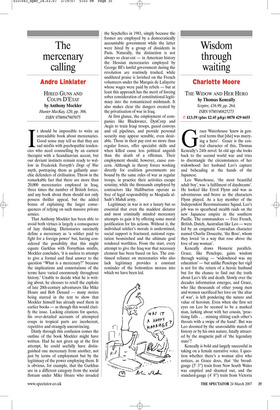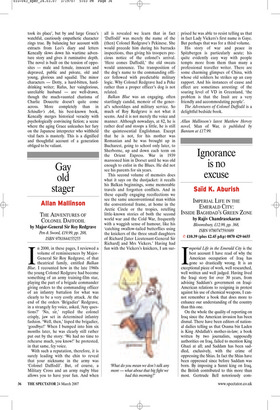Wisdom through waiting
Charlotte Moore
THE WIDOW AND HER HERO by Thomas Keneally Sceptre, £16.99, pp. 264, ISBN 9780340825273 ✆ £13.59 (plus £2.45 p&p) 0870 429 6655 Grace Waterhouse ‘knew in general terms that [she] was marrying a hero’. Grace is the central character of this, Thomas Keneally’s 24th novel. In old age she looks back to the second world war and tries to disentangle the circumstances of her widowhood: her husband Leo’s capture and beheading at the hands of the Japanese.
Leo Waterhouse, ‘the most beautiful adult boy’, was ‘a fulfilment of daydreams’. He looked like Errol Flynn and was as adventurous and brave as the characters Flynn played. As a key member of the Independent Reconnaissance Squad, Leo’s job was to spearhead stealth raids on the new Japanese empire in the southern Pacific. The commandoes — Free French, British, Dutch, Australian like Leo — were led by an enigmatic Conradian character named Charlie Doucette, ‘the Boss’, whom they loved ‘in a way that rose above the love of any woman’.
Keneally draws Homeric parallels. Grace, like Penelope, gains wisdom through waiting — ‘widowhood was my education’ — but unlike Penelope her vigil is not for the return of a heroic husband but for the chance to find out the truth about Leo’s life and death. Slowly over the decades information emerges, and Grace, who like thousands of other young men and women sacrificed her love on ‘the altar of war’, is left pondering the nature and value of heroism. Even when she first set eyes on Leo he seemed to be a marked man, larking about with her cousin, ‘practising falls . . . miming slitting each other’s throats with a swipe of the hand’. But was Leo doomed by the unavoidable march of history or by his own nature, fatally attracted by the magnetic pull of ‘the legendary state’?
Keneally is bold and largely successful in taking on a female narrative voice. I question whether there’s a woman alive who notices, as Grace does, that ‘the broadgauge (5’ 3”) train from New South Wales was emptied and shunted out, and the standard-gauge (4’ 8”) train from Victoria took its place’, but by and large Grace’s watchful, cautiously empathetic character rings true. By balancing her account with extracts from Leo’s diary and letters Keneally slows down his wartime adventure story and gives it ruminative depth. The novel is built on the tension of opposites — male and female, innocent and depraved, public and private, old and young, glorious and squalid. The minor characters — Dotty, a hard-bitten, harddrinking writer; Rufus, her vainglorious, unreliable husband — are well-drawn, though the much-vaunted charisma of Charlie Doucette doesn’t quite come across. More completely than in Schindler’s Ark, his best-known book, Keneally merges historical veracity with psychologically convincing fiction; a scene where the aging Grace unleashes her fury on the Japanese interpreter who withheld vital facts is masterly. This is a dignified and thoughtful account of a generation obliged to be valiant.



















































































 Previous page
Previous page